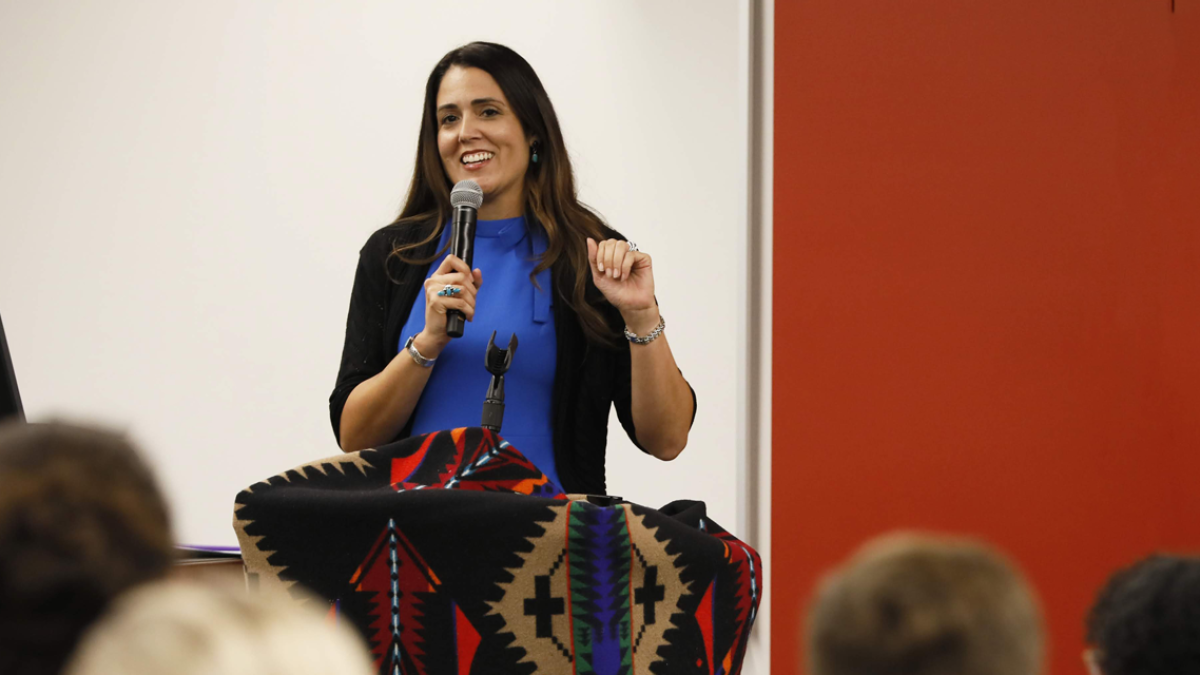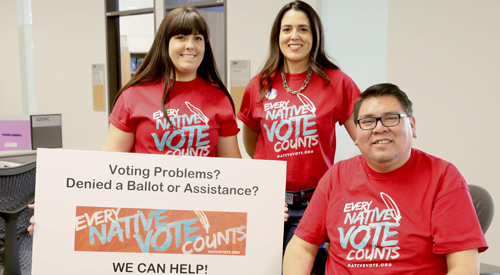ASU Law professor wins American Bar Association diversity award

Patty Ferguson-Bohnee, clinical professor and faculty director of the Indian Legal Program at the Sandra Day O’Connor College of Law, presents at the program's welcome dinner in 2019.
Professor Patty Ferguson-Bohnee, faculty director of the Indian Legal Program at the Sandra Day O’Connor College of Law at Arizona State University, will be honored by the American Bar Association as one of five recipients of the 2020 Spirit of Excellence Award.
Administered by the ABA’s Commission on Racial and Ethnic Diversity in the Profession, the Spirit of Excellence Award recognizes legal professionals who have demonstrated excellence and a commitment to racial and ethnic diversity. Recognizing the challenges that racially and ethnically diverse professionals can face in the legal world, the motto for the award is “Ad Astra Per Aspera,” a Latin phrase meaning “to the stars through difficulties.”
The five recipients will be honored in a ceremony Feb. 15 at the American Bar Association’s midyear meeting in Austin, Texas.
Ferguson-Bohnee, who also directs ASU Law’s Indian Legal Clinic and serves as a clinical professor of law, joined ASU Law in 2007. And according to Robert Osley Saunooke, president of the National Native American Bar Association, her life and career in the legal profession can be summed up by one word: service.
“Her life before, during and after law school has centered on serving others, in and outside the Native American community,” Saunooke wrote in a letter nominating Ferguson-Bohnee for the Spirit of Excellence Award. “She has chaired numerous Native American committees; presided as president of the National Native American Law Students Association, National Native American Bar Association, Native American Bar Association of Arizona (of which she was a founding member) and the Miss Indian Arizona Scholarship Committee. Few have done or been more dedicated to public service in such a short period of time.”
And Saunooke noted, few have done more to advance the cause of Native American voting rights.
“Patty has been a grassroots organizer of the Arizona Native American voting initiative and has organized and written on the unique issues impacting Native American voters,” he said. “She has testified before Congress and the Senate Committee on Indian Affairs, is a published author on Native American voting issues, a panelist on more Native American presentations and issues than anyone I have ever known and does not know how to say no to any request to help the Native American community.”
Longtime ASU Law colleague Myles Lynk, himself a past recipient of the Spirit of Excellence Award, underscored Ferguson-Bohnee’s work for the Indian Legal Program and Indian Legal Clinic, helping Native American communities throughout Arizona, her native Louisiana and the rest of the country.
“She has helped four Louisiana tribes obtain state recognition of their tribal status,” Lynk said. “She has represented tribal clients in administrative, state, federal and tribal courts, as well as before state and local governing bodies, and proposed revisions to the Real Estate Disclosure Reports to include tribal provisions. Patty has represented Native American litigants in complex voting rights litigation on behalf of tribes, and she has drafted state legislative and congressional testimony on behalf of tribes with respect to voting rights’ issues. In fact, Patty serves as the Native vote election protection coordinator for the state of Arizona.”
History of the Spirit of Excellence Award
The award was first given out in 1996, and the latest class brings the total number of honorees to 143. Ferguson-Bohnee is the fifth representative of ASU Law to receive the honor, joining Rebecca Tsosie (2002), Charles Calleros (2011), Kevin Gover (2011) and Lynk (2013).
Calleros said it was an honor to be recognized for his years of work organizing mentoring and prelaw programs for diverse populations of middle school, high school and college students.
“It has been gratifying to see that eighth-grade students in low-income communities can develop arguments in a legal method exercise, that high school students can advocate ably and persuasively in moot court competitions, and that college students can actively engage in a sample class taken from an actual lesson plan for an upper-division law course,” he said.
Lynk was recognized for the work he has done with minority student groups, as well as the National Bar Association, the nation’s oldest and largest national network of predominantly African American attorneys and judges.
“I had done a lot of work to make sure that we were addressing the needs — and to make sure that students were understanding their responsibility to help address the needs when they got into practice — of minority communities who really need legal representation,” he said. “So I was incredibly grateful and incredibly humbled to receive the award. It was quite an honor.”
Lynk said ASU Law is alone in having five Spirit of Excellence winners, and that Ferguson-Bohnee is the third representative from the Indian Legal Program, following Tsosie and Gover.

ASU Law Clinical Professor Patty Ferguson-Bonhee (center), who also runs the Indian Legal Clinic, stands with clinic students and volunteers with the Native Vote Election Protection Project, an outreach effort that helps Native Americans navigate challenges on Election Day.
“The fact that three of those five are from our Indian Legal Program shows that that program is meeting the purpose for which it was established, which was to train lawyers to go out and serve Native American communities,” he said. “This award recognizes lawyers who help and provide services to diverse communities so they have access to justice. And our ILP is doing that in an incredible way. And Patty, especially, has done a remarkable job with her imprint on voting rights and how hard she has fought to make sure votes on the reservation are counted.”
Saunooke pointed out the unique struggles that Native Americans can face in the legal profession and how important it is for others to have role models like Ferguson-Bohnee.
“The Native American legal community is perhaps the smallest group within the legal profession,” he said. “As such it is not easy for a Native American law practitioner to not only find employment and serve in the legal community, but it is also difficult to excel in the profession. Lack of opportunities, misperceptions of Native law and culture, and a host of other issues regularly cause Native attorneys to leave the profession. For this reason, it is readily apparent that the accomplishments of Patty Ferguson-Bohnee represent not only a Spirit of Excellence in the legal profession but a shining light in the Native American community that leads the way for others to believe in and follow. Sometimes it just takes one person to show others what can be done. Patty is that one person.”
More Law, journalism and politics

TechTainment conference explores the crossroads of law, technology, entertainment
What protections do writers, actors, producers and others have from AI? Will changing laws around name, image and likeness (…

How to watch an election
Every election night, adrenaline pumps through newsrooms across the country as journalists take the pulse of democracy. We…
Law experts, students gather to celebrate ASU Indian Legal Program
Although she's achieved much in Washington, D.C., Mikaela Bledsoe Downes’ education is bringing her closer to her intended…